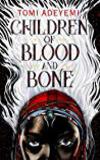
You crushed us to build your monarchy on the backs of our blood and bone. Your mistake wasn’t keeping us alive. it was thinking we’d never fight back.
Children of Blood and Bone is a rather good book. You have a West African world one generation removed from a genocide which managed to take magic from the world. Radically oppressed former magic users with pockets of resistance here and there–and a main character tossed headfirst into the struggle to return their power.
The worldbuilding is neat. It’s got a West African feel, which isn’t something I’ve read overly much about. I can’t really speak to how accurate it would be someone from Nigera (on which Orïsha is fairly heavily based), but it has a different enough feel to appeal.
They wear their secrets like glittering diamonds, embroidery woven through their lavish buba tops and wrapped iro skirts. Their lies and lily-scented perfumes taint the honeyed aroma of sweet cakes I am no longer allowed to eat.
The magic is interesting enough, even if at the core it’s a fairly standard elemental/class based magic system with a number of different schools each with their own focus. The stronger than you often see ties to religion and powers coming from gods/prayers/belief is an interesting twist, as is magic failing because of something men did to that same connection is pretty cool. It makes everything feel a bit more organic than most over organized magic systems like it.
As a kid, I once watched Baba haul Tzain from the depths of a lake, ripping him from the seaweed that had trapped him underwater. He pumped on his fragile chest, but when Baba failed to make him breathe, it was Mama and her magic who saved him. She risked everything, violating maji law to call on the forbidden powers in her blood. She wove her incantations into Tzain like a thread, pulling him back to life with the magic of the dead.
The main downside I had with the book is that the main characters feel like teenagers. I’m not sure how old they’re supposed to be–for all I know, they are actually teens–but it’s fairly annoying how often they’re absolutely sure of a course of action, despite it being a completely terrible idea. All based on what feels like a lack of experience with the world. And then on top of that, exemplifying it, is the romances between various pairs of characters. They flare up with the intensity and suddenness of youth, based on little really between the various characters other than proximity and certain life or death situations. It feels weird and forced and not really necessary to the story.
Characterwise, I liked Zélie and Amari fairly well, although Amari spent most of the book not having much of a home. They were the sorts of heroines I like to see in a book. Inan… was at least a well done character, thoroughly morally conflicted and going back and forth, trying to serve two masters– which of course doesn’t go well. Tzain… we didn’t get enough of him. He’s mostly frustrating because he can’t understand what the rest are going through as directly. The King (Amari and Inan’s father)… oy. I want to know what happened to him to twist him so thoroughly. He’s dark enough to be easy to hate, but there are just enough hints about what drives him… Oy.
Overall, I greatly enjoyed this book. And with an ending quite so O.o-inducing as that, I’m very curious to see what happens next. We’ll just have to wait a few months more.